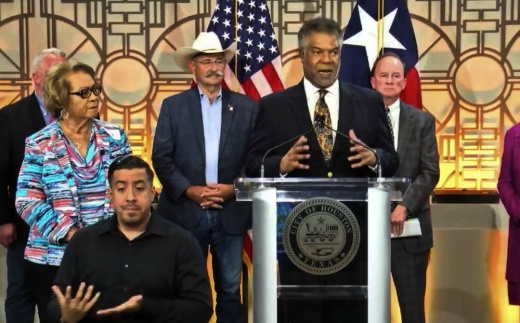As a result, progress on home reconstructions in some areas has stalled or moved forward with a different style and sometimes smaller layout than the homes had prior to the storm. The inconsistency threatens not only the history of these neighborhoods, but the appraised values of the homes as well, said Judson Robinson III, the president of the Houston Area Urban League.
“This is the vehicle that allows them to pass on wealth to the next generation. ... If you take away the tenants of what it takes to have a successful neighborhood ... you are doing a disservice to residents,” Robinson said at a city of Houston press conference about the issue July 26.
At the heart of the disagreement is varying interpretations of deed restrictions in Pleasantville in Northeast Houston and Sagemont in South Houston. In both neighborhoods, community leaders said existing deed restrictions require homes to have specific qualities, such as garages and concrete slab foundations. The Pleasantville neighborhood was one of the first majority-Black communities in the country protected by deed restrictions, said Mary Fontenot, the president of the Pleasantville Civic Club Association, at the press conference.
“Can you imagine owning a home for 30 or 40 years ... and they say, ‘Guess what? We’re going to reduce the size of your home,’” Fontenot said. “What about the equity you have in your home?”
GLO representatives said, however, that funding for the recovery program, which is reserved for low-income households and administered through the U.S. Department of Housing and Urban Development, has restricted uses, which do not include garages or other features listed in the deed restrictions. The land office can only build homes to deed restriction standards, GLO spokesperson Brittany Eck said, if they are enforced by a legally established homeowners association, not a civic club, as is the case in Pleasantville and Sagemont.
“There are limited funds and tremendous remaining needs,” Eck said. “HUD will not allow additional costs beyond the needs of the families, so a house may be bigger or smaller depending on the size of the family and the existing house.”
Mayor Sylvester Turner convened the press conference regarding the issue, making note his administration and the GLO were previously locked in a legal battle over control of the recovery funds for several months. The GLO ultimately received control of the program and its funding.
“When the city had this program, people were very critical, but what I will say, we were rebuilding people’s homes back to the way they were,” Turner said. “We weren’t reducing their value or diminishing their neighborhoods.”
Eck, however, noted as of July 21, after having control over the program for 14 months, the GLO had reconstructed 121 homes in Houston. When the city of Houston was in control of the funds, it was able to construct 45 homes in 14 months, according to the GLO data.





